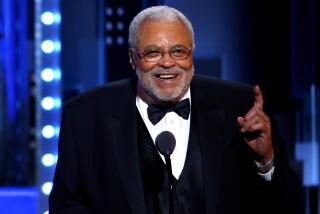‘Tom Jones’ Never Grows Old
- Share via
A&E; has received critical kudos and the appreciation of audiences for its stylish, lavish adaptations of such British literary classics as “Pride and Prejudice,” “Emma,” “Ivanhoe” and “Jane Eyre.”
The cable network’s latest BBC co-production is a rollicking, risque, six-hour dramatization of Henry Fielding’s picaresque novel, “Tom Jones.”
But the big question is: Why “Tom Jones”?
The 1963 movie version is one of the best-loved films of modern times. Directed by Tony Richardson, the bawdy comedy won four Academy Awards, including best film, and made an international star of Albert Finney, who was perfectly cast as the rakish rogue Tom.
Metin Huseyin, who directed the A&E; miniseries, was a big fan of that film. He recalls that when he received Simon Burke’s script in late 1996, he thought: “Why the hell would you want to make ‘Tom Jones’ again?” In British film, it’s like a watershed. It was bit of a milestone in quite a lot of ways.”
But Huseyin found himself quite taken with Burke’s adaptation. “Then I went and found the film,” he says. “I watched the film and thought, ‘This deserves to be remade, because I don’t feel time has been kind to it.’ It inspired a lot of British comedy that came after it, like ‘Benny Hill.’ This script is far closer to the book [than the movie].”
Set in 18th century England, “Tom Jones” chronicles the sexy, silly and funny adventures of a handsome, charming foundling with a heart of gold (Max Beesley), who can’t stay out of trouble or out of women’s boudoirs.
Samantha Morton, who played the title role in “Jane Eyre,” plays Tom’s one true love, the high-spirited Sophia. Brian Blessed is her ill-tempered but loving father, and Benjamin Whitrow is the benevolent country squire who adopts Tom. John Sessions plays Henry Fielding, who serves as the comedy’s on-screen narrator and guide.
Delia Fine, vice president of film, drama and performing arts for A&E;, believes this version is much more akin to the book in tone and spirit than the 1963 film.
“Though the movie was wonderful and was responsible for me developing a major crush on young Albert Finney, it was only a bit of the book,” Fine explains.
“It was a quick romp through the high points, specifically the Tom and Sophia love story. This is a book that’s crammed with plot. I was excited about this one because in six hours you have time to deal with the story. So not only do you get the comedy and the love story and the road movie sense of it, there are a lot of moments that are also very touching that the original movie doesn’t have time to do.”
Though the miniseries has its share of bedroom shenanigans and brief nudity--Beesley’s “full monty” shot was cut for American TV--director Huseyin says that “if we had six hours of bawdy romp, it would get boring. I tried to make the characters as rounded as possible. They go through humor and emotions. If you have sad bits, than the funnier bits are funnier.”
It was also his decision to include Fielding as a character. “It was halfheartedly in the script and was called ‘narrator’ and was being used to stitch things together,” he says. “You can’t read the book without having a real sense of what Henry Fielding was like, so I said, we’ve either to got to develop the narrator into someone or get rid of it. I suggested Fielding and we went with it.”
Fine says everyone agonized over who was going to play Tom. “We felt it had to be someone young, someone believably young. It was really important to cast someone who was unknown and didn’t come with baggage and preconceived ideas. Albert Finney’s performance was a tough act for anyone to follow. What we get from Max is a really refreshing and fresh performance.”
Beesley, who has spent most of his professional career as a musician, understandably was nervous about comparisons to Finney.
“When we made the decision to do it completely differently than the film, and it would be much closer to the book, that’s when I calmed down,” Beesley says. “I thought, ‘OK. I’ll be able to get a hold on it.’ I did watch the film and, for 1963, it was amazing, but I don’t think it has stood the test of time that well. But I thought Finney was brilliant.”
But even more of a hurdle for Beesley was getting through Fielding’s nearly 1,000-page novel before filming began. “It took me about six weeks to read the whole bloody book,” Beesley says, laughing.
Viewers will notice that in this version Tom has much more of a charitable heart than in Finney’s interpretation. “I think Finney’s was a reflection of the swinging ‘60s,” Huseyin says, “all the knowing nods and winks to the camera when women came along. That’s really not the Tom I felt came out of the book. We wanted to make him more thoughtful.”
“I think what was important for me was to get the sensitivity of Tom,” says Beesley. “He’s such a naughty person, for people to have compassion for him we had to get the sensitivity across. Women who have watched it I’ve spoken to have said, ‘He’s a terrible little bastard but we do love him.’ ”
“Tom Jones” was a big hit on the BBC when it aired last November and December. The show’s appeal is no secret to Beesley.
“There are a lot of period dramas that come out in this country and a lot of them are boring,” he says. “The difference with ‘Tom’ is there is a bit of spunk there. It’s a funny tale.”
“It’s a sexy story,” Fine adds. “I think, though, what far and away drives the engine of this plot is what will happen to Tom and Sophia. This is a love story. That’s what keeps you tuning in.”
Part 1 of “Tom Jones” airs Sunday at 5, 7 and 9 p.m., Part 2 on Monday at 6 and 10 p.m. and Part 3 on Tuesday at 6 and 10 p.m. on cable’s A&E.;



